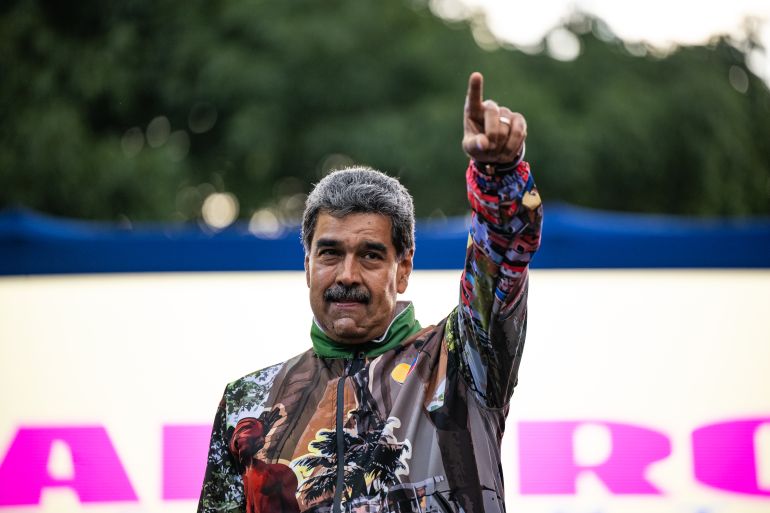Venezuela’s Maduro reshuffles cabinet after contested election victory
As tensions persist over his widely questioned re-election, Maduro makes major changes, naming new interior and oil ministers.
Venezuela’s President Nicolas Maduro raises his hand during a rally with supporters in Caracas [File: Alfredo Lasry/Getty Images]Published On 27 Aug 202427 Aug 2024
Venezuelan leader Nicolas Maduro has made major changes to his cabinet, as protests continue following his success in a recent election rejected by opponents as fraudulent.
Maduro on Tuesday brought in new figures to lead the oil, finance, and interior ministries, among others.
Keep reading
list of 4 itemsend of list
Anabel Pereira is the new finance minister, while Hector Obregon is the new president of state oil company PDVSA, replacing Pedro Tellechea, who will move to head the Ministry of Industries and National Production, Maduro said on state television.
Vice President Delcy Rodriguez will remain in her post, but add the oil ministry to her brief, Maduro added.
Yvan Gil and Vladimir Padrino will remain in their respective posts as foreign minister and defence minister, Maduro said, while governing party leader Diosdado Cabello will be the new interior, justice and peace minister.
The changes are “a profound renovation of the national government and we are putting together a new team which will help us transition everything for this era, open new paths … speed the changes the people need,” Maduro said during an event broadcast live.
Cabello, a close ally of Maduro’s predecessor, the late Hugo Chavez, will return to the cabinet after being the second in command of the governing party PSUV. He is a former vice president and legislator and served as interior and justice minister in the early 2000s.
“Today, I think Venezuela is on the path of definitive peace, a peace with justice, a peace where the people feel that those who have acted against the constitution and the law have justice applied to them on time,” Cabello said.
The changes have come amid long-running tensions in the South American nation, following a July election in which both Maduro and the opposition, which had led him by a nearly insurmountable margin in pre-election polling, claimed victory.
Election observers, opposition members, and regional leaders have all expressed strong scepticism about Maduro’s claims of success, with growing calls for the government to release vote tally data that could help confirm the results.
The opposition has released its own data, tabulated from around the country, purporting to show that it beat Maduro by a 2-1 margin.
The government has led a harsh crackdown on protests and members of the opposition in response, opening an investigation into opposition leader Edmundo Gonzalez Urrutia over his claims that the opposition were the true winners of the election.
Urrutia, who has barely been seen since the elections, has ignored a series of summons to testify as part of that investigation.
Maria Corina Machado, another prominent opposition figure, told the Reuters news agency on Tuesday that street protests and international pressure could push Maduro to step down, but the embattled leader has shown few signs that he is willing to do so.
